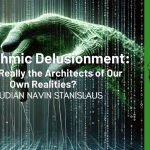Understanding how to engage Gen Z requires authentic interactions and creative solutions. From leveraging their favorite platforms to embracing the nuances of their informed consumerism, businesses must evolve their strategies to stand out.
Aneeta Aby, Senior Strategist at TBWA\RAAD, delineates the key obstacles in capturing Gen Z’s attention, and how AI and social media play roles in this dynamic.
What seems to be the biggest obstacle when it comes to grabbing the attention of Gen Z’ers? How are you cutting through the noise to engage with them?
Knowing what the best ways to attract Gen Z are, is not just about practicing the latest TikTok dance or being up to date with the lingo.
It’s about personally being in touch with them by either hiring more Gen Z employees or consulting with the ones in your circle. After all, they know best about what grabs their attention. Put them in charge.
Cutting through the noise comes with being relevant and informed on what irks them and what doesn’t. Follow pages that focus on pop culture and keep an eye out on online forums such as Reddit – gaining insight into what is going on in real time is as simple as lurking in the comments section of their posts.
Be charismatic and “woke” and the rest will follow, when it comes to us.
Look at brands like Duolingo and RyanAir. They made topics like language learning and commercial flights seem interesting because of a great social media content strategy that gets engagement numbers like no other.
Moreover, thanks to the page managers, the brands seem to have a humorous personality that Gen Z love because they trust the brands to say it as it is.
Finally, using the right spokespeople (AKA online creators, influencers) gets you bonus points.
Gen Z is one of the first generations to have grown up with access to the internet. With the purchasing power Gen Z’ers now have, do you see them as informed consumers? How do they differ to past generations of consumers?
A B S O L U T E L Y.
Gen Z is more choronically online than most which gives them access to a plethora of information from as many POVs as possible. This leads them to being informed consumers considering they know what’s available in the market, what’s the real deal, what’s a dupe and what’s just a mere capitalistic nudge.
This is also what sets them apart to other generations considering they know a bit of everything unintentionally. But the problem arises when they end up being echo chambers rather than owning up to differing viewpoints.
Is AI useful for connecting with younger audiences?
Gen Z has been used to exponential advancements in tech and innovation for as long as they can remember. Using AI does not phase them as much as previous generations. It’s part of their daily lives in more ways than they realize.
This does not imply that we prefer AI over human connections. TBWA’s latest Backslash Edges report goes into detail about how Gen Z still crave interactions with real people in real time.
Brands such as Replika, ChatGPT are jumping on this bandwagon by offering products that solve this issue through AI though. Honestly, nobody’s complaining. A win is a win.
Which social platforms are still relevant and how brands are using those to sell to GenZ?
If you’re marketing to Gen Z without being TikTok-first, that’s a red flag. The way in is to ALWAYS get them hooked in the first 3 seconds, irrespective of whether it’s video or static content.
Beyond consumption of content, Gen Z uses Instagram and TikTok primarily to also stay up to date with what’s going on around the world. As biased as I am to my people, I must confess that this is not a good strategy for being in the know, considering how information is manipulated online.
With the overwhelming amount of information we have today, nostalgia for simpler times seems to be on the rise. Do you feel that the advertising industry will, or has already, shifted towards leaning into early 2000s nostalgia trend?
The early 2000s was definitely a simpler time. Ads were not obsessive about being politically correct but wanted to cater to their audiences in disruptive and cheeky ways. In my opinion, it’s a great time to reminisce about, primarily with legacy brands that have been around for generations.
Would there be a shift back towards this era? I don’t think so. Nostalgia is a feeling best experienced from time to time, the whole notion is lost when it is prevalent everywhere and anywhere.
Moreover, when it comes to ad copy and visuals being as bold as it used to be, that’s a tricky path that most brands are never going to opt for from here on out.
MARKETING Magazine is not responsible for the content of external sites.










